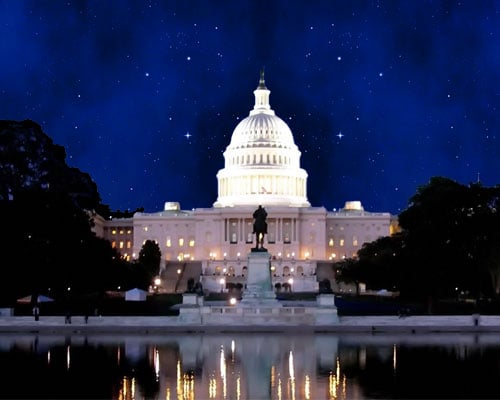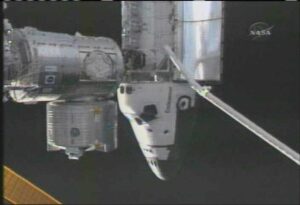Public Policy and Government Affairs
Biweekly Washington, D.C. Update for the Week Ending March 11, 2022
Written by: Elizabeth Anderson

This week in Washington, Congress passed a $1.5 trillion omnibus spending bill including a slight overall increase to NASA’s budget, military leaders emphasized that China is a greater national security threat than Russia, Bahrain and Romania signed the Artemis Accords, and China announced plans to open its space station to commercial partners.
Space Foundation Virtual Events
Space Matters – March 15 at 1 PM ET
Space Foundation’s new series, “Space Matters,” convenes well known policy influencers for high level space policy conversations on emerging topics and trends within the global space economy. Check out the third episode here airing Tuesday March 15th at 1pm ET. Our policy influencers will dig into the current Russian conflict, and what that means for Space on a Civil, Commercial and National Security perspective.
Start Here for Space – March 16 at 1 PM ET

The final episode of Start Here for Space Season 3 features Redwire President and COO Andrew Rush who talks us through his vision for the Future of the Space Industry. Airing Wednesday at 1pm ET here.
US Space Policy Updates
- Congress passed a $1.5 trillion omnibus spending bill which includes $24 billion for NASA (Time and Space News, March 10)
- Residents in Camden County, Georgia blocked an agreement to purchase land for the proposed Spaceport Camden (NPR, March 10)
- Congressional Appropriators halved the Air Force’s hypersonics program budget, halting the possibility of purchasing hypersonic missiles this year (Breaking Defense, March 9)
- US Space Systems Command announced restructuring efforts (Executive Government, March 4)
- Air Force Secretary Kendall reassured US launch efforts would not be impacted by Russia’s decision to stop supplying rockets (Space News, March 4)
- NASA modified its Commercial Crew Transportation Capability contract with SpaceX to allow for three more missions (NASA, March 4)
- Air Force Secretary Kendall highlighted China as a greater national security threat than Russia during the Air Force Association’s Air Warfare Symposium and the McAleese Defense Programs Conference (March 3 and March 9)
- The joint NASA-NOAA GOES-T mission launched from Cape Canaveral Space Force Station (NOAA, March 1)
- The Space Development Agency (SDA) announced $1.8 billion in contracts for mission-capable satellites (Breaking Defense, February 28)
International Space Policy Updates
- China plans to open its space station to commercial partners (Space News, March 11)
- A Chinese government official called for greater satellite protection (SpaceNews, March 10)
- Bahrain signed the Artemis Accords (NASA, March 6)
- Dmitry Rogozin, Head of Roscosmos, threatened to terminate Russia’s participation in the International Space Station (ISS) (ABC News, March 3)
- Romania signed the Artemis Accords (NASA, March 2)
- South Korea’s satellite launch schedule from Russia’s Baikonaur Cosmodrome continues to push forward with the possibility of delays (Space News, March 2)
- China launched 22 satellites on its Long March 8 rocket (Space Flight Now, February 27)
- The European Space Agency (ESA) announced ExoMars is unlikely to launch in 2022 due to Russian sanctions (Scientific American, February 27)
- Russia has stopped collaboration with Europe on Soyuz rocket launches (CBS News, February 26)
Space Industry Updates
- Astrolab revealed a new lunar rover design (The Verge, March 10)
- Space Domain Awareness company Slingshot Aerospace closed a $25 million Series A funding round (Tech Crunch, March 10)
- Israeli-founded satellite microchip manufacturer SatixFy plans to become the space industry’s next SPAC (Bloomberg Law, March 9)
- Lockheed Martin and Raytheon look to utilize and invest in Saudi Arabian manufacturing (Reuters, March 8)
- David Wajsgras is set to become Intelsat’s next CEO (Intelsat, March 7)
- Astra has identified what went wrong in their attempted February 10th launch (Astra, March 6)
- Lockheed Martin’s Nik Smith announces his company’s intentions to found a facility in the United Kingdom (Janes, March 4)
- Privateer, a company co-founded by Steve Wozniak, released a new space visualization tool (Space News, March 4)
- OneWeb has suspended all launch operations from the Russia’s Baikonaur Cosmodrome (Space Policy Online, March 2)
- Space Force has contracted General Atomics and Orion Space Solutions to build weather satellites (Orion Space Solutions, General Atomics, March 2)
- SpaceX enabled Starlink services in Ukraine after a call from Ukrainian government officials via Twitter (Reuters, February 28)
- Rocket Lab USA chose Wallops Island, Virginia as the location for their first launch, manufacturing, and operations headquarters (Rocket Lab USA, February 28)
Space Leader Spotlight

Ezinne Uzo-Okoro
Ezinne Uzo-Okoro is the White House Office of Science and Technology Policy’s Assistant Director for Space Policy. Uzo-Okoro holds an undergraduate degree from Rensselaer Polytechnic Institute; three masters degrees in Space Systems, Space Robotics, and Public Policy from Johns Hopkins, MIT, and Harvard; and is set to complete a PhD in Aeronautical and Astronautical Engineering this year from MIT.
Uzo-Okoro began her career at NASA. She worked her way up from Senior Computer Scientist to Chief of the Small Spacecraft Mission Design Division, leaving to serve in the Biden Administration. Throughout her time at NASA, she contributed to and led over 60 space-flight programs specializing in on-orbit servicing, assembly, and manufacturing (OSAM), orbital debris, and planetary protection. She also used her expertise as an engineer to help construct NASA-owned remote-sensing algorithms.
Besides her illustrious space career, Uzo-Okoro has many other areas of expertise. Uzo-Okoro is one of 43 people Former President George W. Bush detailed in his book Out of Many, One: Portraits of America’s Immigrants. She also discussed her story and values on a panel alongside Madeleine Albright; has worked to fight food insecurity, and is a Term Member at the Council of Foreign Relations.
Reading Corner
The Washington Post | Opinion: Our partnership with Russia can’t go on
National Space Council member and former NASA engineer Homer Hickham argues that the politics of spaceflight has “catching up to do”.
Fun Fact

On March 11, 2008, the first Japanese module, nicknamed Kibo, launched to the International Space Station.
Written by Elizabeth Anderson and Gabriel Flouret
Image credits to Space.com, MIT, and Redwire

